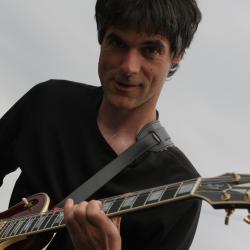 When you want to learn to play a particular style of guitar playing it helps if you listen a lot to that kind of music. It may seem like an obvious remark to make but when it comes to playing blues guitar I cannot stress that enough: There are so many different styles of Blues guitar, and once you will learn about the Minor Pentatonic scale you may feel you are there but watch out: Most of those guitar players may use any of those notes in that scale but you need to listen, learn about phrasing and listen to lots of different forms of blues to see what is behind those notes.
When you want to learn to play a particular style of guitar playing it helps if you listen a lot to that kind of music. It may seem like an obvious remark to make but when it comes to playing blues guitar I cannot stress that enough: There are so many different styles of Blues guitar, and once you will learn about the Minor Pentatonic scale you may feel you are there but watch out: Most of those guitar players may use any of those notes in that scale but you need to listen, learn about phrasing and listen to lots of different forms of blues to see what is behind those notes.
The great three I mentioned before all helped to develop and modernise the idiom of the Urban Chicago style. The Chicago style is closely related to the development of the electric guitar too! Most of the early Blues players used Gibson or Fender electric guitars.
When you listen to B.B, Albert and Freddie you will find that all three have a lot of overlapping ideas, they can all sound so similar to each other but do not be fooled: each of them do have their characteristic styles and trademarks: Freddie’s sound is quite woody, Albert’s sound is quite stingy whereas B.B’s sound is very smooth and almost lazy. These are just general remarks as each of them could sound easily like on of the other.
Listen to other electric blues guitarists as well to see if you can hear any of the B.B, Freddie and Albert influences and sounds. Eric Clapton is an obvious example, you hear him often doing the large bends a la Albert King. Garry Moore could easily sound like any of those three. He recorded with Albert and B.B, he also played with Albert Collins who I left out here, as he was younger than the three Kings.
The three Kings are mentioned so often and out of all B.B was probably the most well-known one. Freddie did play a lot of diverse style of songs, not just the straight forward Blues material, he was also a very good singer.
Try to pick one song of any of the three and copy one solo idea as close as you can. A lot of those ideas can be played over the whole song, that is the beauty of them. The next step is to develop those ideas into your own playing.
Do not just listen to the notes, listen to what kind of emotion is behind them. Blues is about story telling, listen to the lyrics of the song and the emotion which is used to put the message across.
Again I will mention Eric Clapton who learned so well from all of this: In his non-blues music you can still hear the roots and what is behind the music.
Do not just listen to any of those three mentioned above, they are a good starting point if you are new to the blues. Listen to someone like Muddy Waters, who is very different in his phrasing and approach, his style is closer to the country blues style, but equally he is one who helped to modernise and electrify the genre.
Today a lot of guitar players approach the Blues from a Rock style approach. I guess a lot of guitar players love playing with a heavier sound, more dirty that the older guys. The heavier your sound the less subtle is becomes too. See if you can hear these differences for yourself and learn to appreciate those more primitive approaches from the 1950s. 60s and early 70s.
If you live in the Leeds area and want some help (or inspiration) with your blues guitar playing, give me a call on 07796 808633 to see what I can do for you.
If you like jamming on Blues music, there is a Blues Night every third Tuesday in Bradford at
Factory Street Studios, Unit 9, Factory Street in Bradford, BD4 9 NW, Tel: 01274 682125. No need to bring amps, just bring guitar, bass or drumsticks and enjoy!
Cheers,
Eddie

